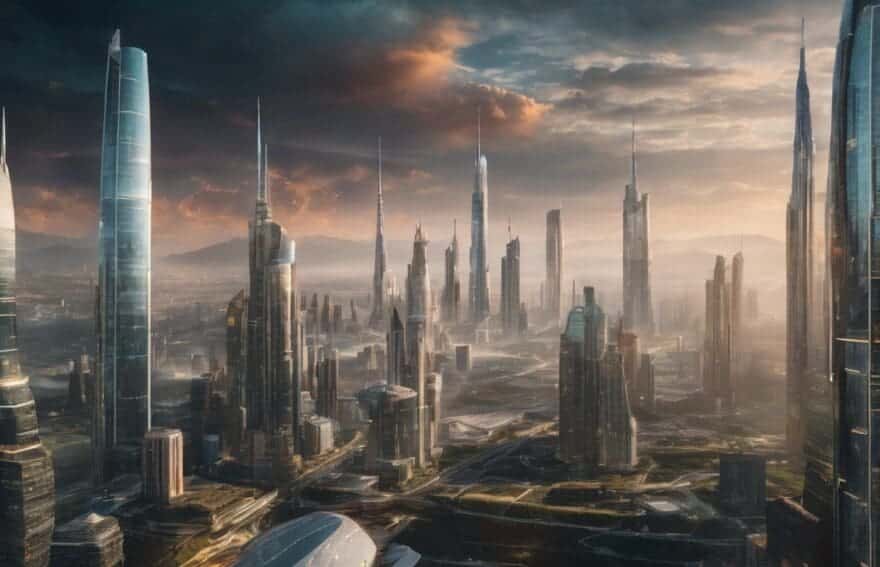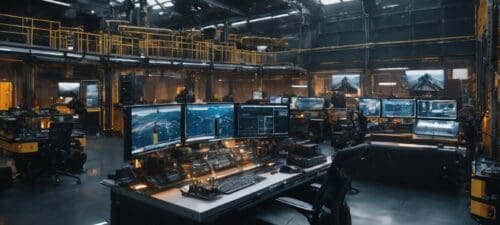The Outer Worlds: Corporate Space Colonies and Moral Choices

Updated On: November 09, 2025 by 
Are you struggling to make tough moral decisions in The Outer Worlds? As a fellow player, I understand the complexities of navigating corporate control and ethical dilemmas in this dystopian game. Through in-depth research, we’ve compiled a guide to help you make meaningful choices and navigate the world of ultra-corporate space colonies. Join us as we explore the moral landscape of The Outer Worlds and uncover the impact of corporate control on interstellar colonies.
The Outer Worlds: a dystopian game exploring potential futures
In “The Outer Worlds”, we immerse ourselves in a dystopian future where mega-corporations dictate the course of human civilisation across the stars. Our journey takes us to Halcyon, a colony under corporate rule since the early 23rd century, shaped by capitalist greed and power struggles.
We face tough moral decisions that echo through space and time — choices that can uplift or doom entire colonies.
Our paths cross with characters presenting dilemmas painting shades of grey on a canvas of corporate ethics. We navigate political satire as we encounter governing bodies more focused on profit than people’s wellbeing.
As players, our actions stand against or alongside these corporations as we forge futures in this scifi RPG landscape. The stakes are high; every decision counts in shaping interstellar destinies leading up to complex choices involving politics, society, and morality—elements awaiting exploration in the next segment on “The Role of Corporations and Moral Choices”.
The Role of Corporations and Moral Choices
Corporations play a significant role in the colonies of The Outer Worlds, exerting their influence and control over the inhabitants. The game presents players with complex choices and moral dilemmas, reflecting the impact of corporate power on society.
Influence of corporations on colonies
In The Outer Worlds, we witness a universe dominated by mega corporations, akin to the monopoly moguls of our past. These corporate entities hold immense power over space colonies, acting as de facto governments and deciding the fate of their inhabitants.
As players, we see firsthand how these companies have transformed colonies into extensions of their own will. They install company towns where workers live under strict corporate rule, face exploitation, and can barely scrape by.
Navigating through the game’s landscapes reveals this stark reality: space exploration has morphed into an extension of capitalism run amok. Every choice we make within these extraterrestrial societies carries weighty ethical implications—whether it’s dealing with labor strikes or addressing resource scarcity—and underscores the critical role that corporations play in shaping life on distant planets.
It’s not just about survival; it’s a matter of morality under corporate control in outer space.
Complex choices and moral dilemmas
As players navigate The Outer Worlds, they are consistently confronted with complex moral decisions that have far-reaching consequences. Whether it’s deciding the fate of a colony or determining the future of specific characters, these choices weigh heavily on players’ minds.
The game’s missions involving corporations often present dark and morally ambiguous scenarios, adding layers of complexity to decision-making. These ethical outcomes not only affect the immediate gameplay but also shape the broader narrative of corporate space colonies in the game’s universe.
The interstellar travel and capitalist society depicted in The Outer Worlds challenge players to think critically about their moral compass and ethical decision-making as they grapple with difficult choices that can shift the balance of power within the game’s universe.
10 of the Hardest Decisions in The Outer Worlds
– The game presents players with difficult choices, such as deciding whether to kill or spare Eva Chartrand, convincing Caleb to go back to work or support his strike, and making decisions that have far-reaching consequences for the colony’s future.
– Each decision forces players to weigh their moral values against the potential outcomes, adding depth and complexity to the gameplay experience.
Kill or spare Eva Chartrand
In The Outer Worlds, players are faced with the moral decision of whether to kill or spare Eva Chartrand. This choice can have significant consequences for both the character and their interactions within the game’s universe.
By choosing to spare Eva Chartrand, players may experience unexpected outcomes and alternative mission paths, impacting their overall gameplay experience. Conversely, deciding to kill Eva Chartrand could lead to different storylines and potential repercussions throughout the game.
The decision to kill or spare Eva Chartrand in The Outer Worlds presents players with an opportunity to engage in morally complex choices that ultimately shape the outcome of their journey through corporate space colonies.
Convince Caleb to go back to work or support his strike
Attempting to convince Caleb to go back to work or support his strike is a pivotal decision in The Outer Worlds. This dilemma embodies the game’s complex moral choices, as players must navigate the consequences of their actions on the colony.
As digital pioneers exploring extraterrestrial colonies, gamers are challenged with ethical decision-making that impacts not only individual characters but also the political implications within the game’s universe.
Convincing Caleb to return to work or supporting his strike prompts players to weigh their involvement in shaping Halcyon’s future. This decision showcases the depth of meaningful politics in The Outer Worlds, allowing for active engagement with factions and embodying the satirical critique of capitalism extended into space colonisation.
Give the module to Sanjar or Graham
After navigating the tough choice of either convincing Caleb to go back to work or support his strike, players in The Outer Worlds find themselves faced with yet another moral dilemma: whether to give the module to Sanjar or Graham.
This decision holds significant weight, as it directly impacts the future leadership of Monarch. Players must carefully consider the consequences of their actions and how it will affect both individuals and the overall outcome for Monarch.
The option of giving the module to Sanjar ensures a more corporate-friendly approach, potentially leading to increased productivity but at the cost of employee welfare. Conversely, choosing Graham’s side aligns with workers’ rights but may result in reduced efficiency.
Turn Welles in or help him
In The Outer Worlds, players are faced with the difficult decision of either turning Phineas Vernon Welles in or helping him. This choice significantly impacts the game’s storyline and the fate of Halcyon colony.
Welles is a key character working against the ultra-corporations that rule over the universe. Players must weigh their moral compass as they decide whether to support Welles’ mission to free colonies from corporate control or comply with authority figures within the industry.
The decision to turn Welles in or help him provides an opportunity for players to explore different ethical paths and experience varied consequences based on their choice. As they navigate this morally complex scenario, they will be reminded that every choice has a ripple effect throughout the gameplay, ultimately shaping the future outcomes within The Outer Worlds’ corporate-controlled universe.
Divert power to Edgewater or the Botanical Lab
When faced with the decision to divert power to Edgewater or the Botanical Lab in The Outer Worlds, players must carefully weigh their options. This choice highlights the moral dilemmas present throughout the game, where decisions have far-reaching consequences.
By choosing to divert power, players influence not only the immediate outcome but also impact the future of either location. This decision reflects the overarching theme of ethical decision-making and the complex nature of corporate control within the game’s universe.
Choosing whether to divert power to Edgewater or the Botanical Lab involves considering various factors such as each location’s needs and how it aligns with players’ personal values and goals.
Meaningful Politics in The Outer Worlds
Explore the satirical commentary on capitalist society and its impact on the game’s political decisions, as well as the morality in missions involving powerful corporations. The Outer Worlds challenges players to navigate complex ethical choices within a corporatist hell.
Satire of capitalist society and its impact
The Outer Worlds presents a thought-provoking satire of capitalist society and its impact on the future. The game depicts an ultra-capitalist future where corporations control not only economies but entire colonies, reminiscent of historical industrial tycoons like Rockefeller and J.P.
Morgan. Through engaging with this dystopian vision, players are prompted to navigate complex moral choices influenced by corporate power, highlighting the potential consequences of unregulated capitalism in a spacefaring world.
As players grapple with decisions that affect entire colonies, the game serves as a cautionary tale about the dangers of unchecked corporate control over society.
The game’s portrayal of corporate dominance offers a poignant reflection on real-world ethical dilemmas and political commentary surrounding powerful corporations’ impact on societies and economies across history.
Morality in missions involving corporations
The Outer Worlds paints a morally complex picture when it comes to missions involving corporations. The game presents players with difficult decisions that can have far-reaching effects on the Halcyon colony and its inhabitants.
Players are faced with choices that force them to navigate through ethical dilemmas, reflecting the impact of corporate control in a capitalist-driven future.
In these missions, players must consider the consequences of their actions as they interact with powerful corporations within the game’s universe. The gameplay provides an opportunity for engagement with factions and making choices that will shape the outcome of the colonies.
The Outer Worlds as a Corporatist Hell
Ultra-corporations rule over colonies in The Outer Worlds, showcasing the consequences of privately-funded space colonisation. The game presents a dystopian vision of corporate control and its impact on society.
Ultra-corporations ruling over colonies
Ultra-corporations dominate the colonies in The Outer Worlds, establishing a dystopian society where corporate power reigns supreme. Players are faced with navigating complex moral decisions that have far-reaching consequences, many of which revolve around challenging the authority and influence of these powerful corporations.
The game presents a chilling vision of a future where mega-corporations control every aspect of life in the colonies, depicting the potentially devastating impact of unchecked corporate dominance on society and individuals.
Playing The Outer Worlds provides an immersive experience delving into the ramifications of ultra-corporations ruling over colonies. With ethical decision-making at its core, players must navigate through a morally ambiguous world where corporate interests hold sway over every aspect of life.
Consequences of privately-funded space colonisation
Privately-funded space colonization in The Outer Worlds resulted in dire consequences, with mega-corporations gaining unchecked control over entire colonies. Players are confronted with the ethical dilemma of navigating a world where corporate interests supersede moral considerations.
The game vividly portrays an extreme capitalist-driven future, drawing parallels to historical figures like Rockefeller and J.P. Morgan, emphasizing the potential dangers of unregulated corporate dominance in space.
The decisions players make within this framework can impact the fate of entire colonies and illustrate how privately-funded space colonization led to an unscrupulous quest for power and profit at any cost.
Conclusion
In conclusion, The Outer Worlds serves as a cautionary tale about the dangers of corporate control in space colonisation. The game challenges players to navigate complex moral choices and explore the impact of ultra-corporations on society, making it an important commentary on the potential future of capitalism in outer space.
The Outer Worlds as a commentary on the dangers of corporate control
The Outer Worlds serves as a thought-provoking commentary on the perils of corporate dominance in a futuristic space setting. Players navigate through complex moral dilemmas, underscoring the potential consequences of corporate control over colonies and their inhabitants.
Delving into this narrative requires careful ethical decision-making, emphasising the weighty impact of choices within a universe ruled by mega-corporations and their relentless pursuit of profit.
Looking at The Outer Worlds, one can recognise parallels to historical figures like Rockefeller and J.P. Morgan who wielded substantial influence in industries during capitalism’s early years – shedding light on the dangers that unfettered corporate power can pose in shaping societal structures.
It showcases how privately-funded space colonisation led to ultra-corporate rule over entire star systems and sets an engaging stage for players to confront these themes within an immersive gaming experience.
The importance of meaningful political choices in games.
Transitioning from the commentary on the dangers of corporate control in The Outer Worlds, it’s crucial to recognise the importance of meaningful political choices in games. This aspect not only adds depth and complexity to gameplay but also offers a thought-provoking experience for players.
The ability to make decisions that have significant consequences within the game’s political landscape allows players to engage with larger societal issues and explore different ideological perspectives.
By presenting players with challenging moral dilemmas and complex decision-making scenarios, games like The Outer Worlds encourage critical thinking and reflection on real-world political dynamics.
The inclusion of meaningful political choices in games serves as a platform for players to understand how their decisions can influence virtual societies, economies, and power structures.
It provides an opportunity for individuals to consider the ethical implications of their actions within a fictional political framework, fostering empathy and understanding towards differing viewpoints.
FAQs
1. What is The Outer Worlds about?
The Outer Worlds is a video game where you explore corporate space colonies and face tough moral choices that affect the story.
2. Can I make ethical decisions in The Outer Worlds?
Yes, as you play, you’ll be faced with numerous ethical decision-making opportunities that shape the game’s outcomes.
3. How do moral choices impact gameplay in The Outer Worlds?
Your moral choices determine how characters react to you and can change the direction of your journey through the space colonies.
4. Will my decisions influence the ending of The Outer Worlds?
Absolutely! Every choice has consequences, so your ethical decisions will significantly influence how things wrap up for your character.









